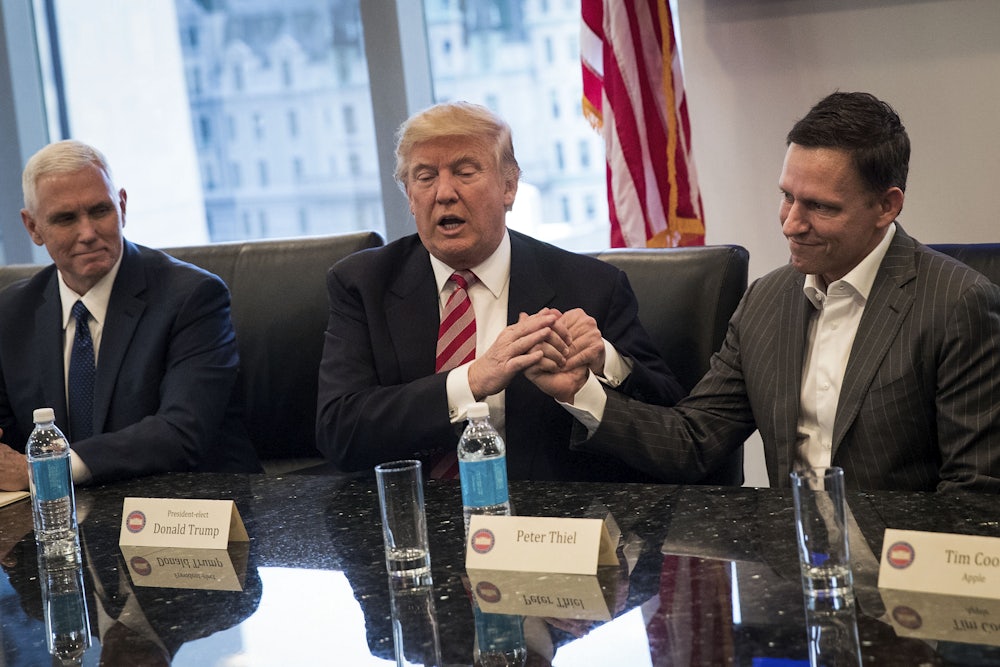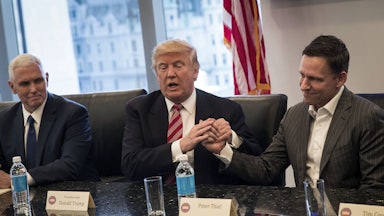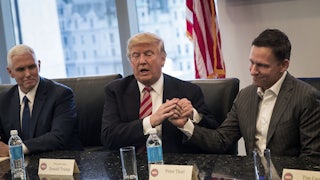Peter Thiel, the free press–hating, alleged young-blood enthusiast who also happens to be one of the richest people alive, has emerged as the Republican Party’s latest kingmaker. Thiel is, per OpenSecrets data, the co-leader among GOP donors this cycle, funding an array of pro-crypto, anti-China candidates, spending tens of millions on congressional candidates during an election year in which Republicans are expected to triumph without his involvement. A longtime donor, Thiel nevertheless will almost certainly see his cachet among conservatives grow exponentially: Having stepped down from Facebook’s board earlier this year, Thiel is positioned to gain an enormous level of influence within right-wing politics practically overnight.
For most of the last six years, many on the right have attempted to intellectually backfill Trumpism, turning Donald Trump’s sketched-out ideology (when it was coherent at all) into some discernible set of political beliefs. In office, Trump reverted into a rather pro-forma type of Republican. But Thiel is bringing vast resources to an effort to conjure what might have been, pushing a distilled version of the former president’s antagonistic foreign policy and authoritarianism. Republican donors have long seen the popular will as an obstacle to overcome but have stopped short of catastrophizing democracy itself—the Koch brothers, for example, generally used their money and influence to shape popular opinion along their preferred anti-tax and anti-regulatory lines. But Thiel is more explicitly anti-democratic. In 2009, he published a piece arguing that he had come to “no longer believe that freedom and democracy are compatible.” Seven years later, he secretly used his considerable resources to bankrupt Gawker as revenge, after one of its blogs had outed him years earlier.
The candidates Thiel is backing tell a clear story of where he hopes to lead the Republican Party. At a fundraiser for Wyoming Republican Harriet Hagerman, who is challenging Liz Cheney in Wyoming’s upcoming primary election, Thiel made it clear that his ultimate goal was to unseat all of the “traitorous 10” Republicans who had voted to impeach Donald Trump for incitement of a riot after his supporters breached the Capitol to try to interrupt the peaceful transfer of power on January 6 of last year. All told, Thiel has spent more than $20 million backing 16 House and Senate candidates who back the “big lie” that Donald Trump was the real winner of the 2020 election. Arizona Senate candidate Blake Masters has said, “It’s really hard to know” if Biden was the real winner of the election, while in Ohio the flailing J.D. Vance—who was against Trump before he was for him—has insisted that Thiel’s Facebook buddy Mark Zuckerberg was behind a massive voter fraud effort.
But Thiel isn’t just selecting candidates based on their stance on voter fraud. Thiel has ripped into tech companies for being too cozy with China—even, in 2019, going as far as to suggest that the FBI should investigate whether spies from that nation had infiltrated Google—and is now spending millions in support of belligerent China critics and their cause. These include Missouri’s Eric Schmitt, who sued China over Covid-19 as the state’s attorney general, as well as North Carolina representative Ted Budd, who published a piece arguing that China is “not a force for good.” As New York’s Choire Sicha noted in a piece earlier this week, “If you’re a Republican candidate striving for financial support from this particular billionaire, attacking China is probably a good way to get [Thiel’s] attention.”
Part of Thiel’s focus on China also reflects his obsession with cryptocurrency. Thiel has called crypto a “Chinese financial weapon” aimed at undercutting the U.S. dollar’s status as the global reserve currency. “Even though I’m a pro-crypto, pro-Bitcoin maximalist person, I do wonder whether, at this point, Bitcoin should also be thought of in part as a Chinese financial weapon against the U.S.... It threatens fiat money, but it especially threatens the dollar,” Thiel said during a roundtable discussion at the Nixon Foundation last year. Nearly all of the candidates Thiel is backing are crypto enthusiasts, with many explicitly making the case that the United States use cryptocurrency as a means of countering the Chinese—Masters, for instance has suggested that the U.S. build a reserve of crypto.
Thiel’s opposition to China is about global influence and economics—not democracy, however. This is a significant break with the ways the U.S. has previously confronted China, with an eye toward broadening the appeal of democracy as a means to combat the perils of autocracy. Thiel would rather meet Chinese autocracy with an American version, rooted in the darker ideological strains that Silicon Valley has fostered in recent years. True to form, the candidates and ideas that he’s supported with his considerable wealth all flirt with a U.S. that’s less democratic and more unequal. The future he wants is one arguably even bleaker than the one being pushed by Donald Trump: one in which confronting the Chinese abroad and suppressing democracy at home are intertwined—one vertically integrated authoritarianism to rule them all.










